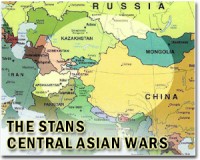 |
Narang, Afghanistan (AFP) Dec 11, 2009 Ghulam Nabi has a problem: for the past year he has worked with US soldiers to improve livelihoods and security in his district of Afghanistan. Now he worries they will leave. Eight years after US-led troops ousted the Taliban regime, President Barack Obama is hurling 30,000 reinforcements into battle. But his strategy for bringing peace also enshrines July 2011 as the start of their withdrawal. "Why does he want to pull out soldiers from Afghanistan in a year and a half?" says Nabi, head of the eastern district of Narang. "I'm really worried." Sitting opposite, Lieutenant Colonel Mark O'Donnell tries to reassure Nabi, an Afghan elder on whom the Americans depend in the battle for hearts and minds that is central to the struggle against Taliban insurgents in Kunar province. "I want him to know our commitment is going to continue for a long time," O'Donnell, commander of the 1st battalion, 32nd infantry regiment, explains through his interpreter. Visiting Oslo Thursday to accept the Nobel Peace Prize, Obama said he was "unambiguous" about the July 2011 date to draw down troops and begin to transfer responsibility to Afghan forces. The timeline may not be well known in Afghanistan, where 70 percent of people are illiterate and only a minority have television sets. But elders and governors who have been empowered by the US-led invasion and subsequent alliances with the Americans are worried about the future. "I'm happy if you're staying here longer," says Nabi, who knows his alliance with the Americans in an area so close to the Pakistani border and infested with Islamist extremists could cost him his life. Reassured, at least temporarily, he leads O'Donnell into a gathering of local tribal elders, a shura, where influential men of the area hold steaming glasses of tea and thrash out the problems of the day. About 30 elderly men with beards, snuggled in blankets to keep out the cold, discuss deteriorating security, drug trafficking, smuggling and road accidents. O'Donnell shows respect: he takes care to remove his helmet, bullet-proof jacket and sunglasses, and says a few words in Pashtu. After a year on the ground, his division is preparing to leave and hand over to fresh soldiers arriving under the new strategy, which has building bonds with Afghans at its heart. "What I have learned this year: the power is in the people, the power is in the tribe. They are stronger than the coalition and much, much stronger than insurgents," O'Donnell tells the gathering. "I look at the insurgents like a spider. When a spider comes at an ant, there is nothing the ant can do against the spider. "But if the spider comes at an ant hill, all the ants together will kill the spider. The ant hill is the people, the tribes," he says, to nods all round. Further south in the district of Khas Kunar, a US State Department official takes public diplomacy to the frontlines -- giving regular lessons in English and American culture to children in a camp for the displaced. A black American and a Muslim, Julius Johnson dons a traditional Afghan beret to teach nearly 80 boys the alphabet and numbers in English, interjected with prayers and Koranic verses. It is perhaps one answer to the Islamist madrassas that pump out young foot-soldiers for the Taliban insurgency. Major Scott Horrigan from O'Donnell's regiment walks into the classroom, picks out a child and starts to laden him with military hardware to shrieks of laughter from the pupils: a helmet, a flask, a radio, then night-vision goggles. "When you see soldiers, there is nothing to be scared of. They are meant to protect the population. Their equipment is to protect you and your family," Horrigan tells the children. "These kids are the future. They are ready to learn. We can't afford to lose them," said Johnson. But not all Americans demonstrate the same openness. On patrol, gunners riding armoured vehicles -- built to resist killer Taliban bombs but difficult to manoeuvre down narrow lanes -- frequently hurl abuse at Afghan drivers that get too close. "Get the fuck out of the fucking road, fucking cock-sucker," shouts one soldier oblivious -- at least at that moment -- to hearts and minds. Share This Article With Planet Earth
Related Links News From Across The Stans
 U.S. launches new bid to hunt bin Laden
U.S. launches new bid to hunt bin Laden Beirut, Lebanon (UPI) Dec 9, 2009 As the United States braces for a major escalation in the war in Afghanistan and Pakistan, it is launching a new drive to kill or capture Osama bin Laden, declaring that he's the key to defeating al-Qaida. But almost eight years to the day after the Americans let him slip through their fingers at his Afghan mountain redoubt of Tora Bora, his last confirmed location on or about Dec. 16, ... read more |
|
| The content herein, unless otherwise known to be public domain, are Copyright 1995-2009 - SpaceDaily. AFP and UPI Wire Stories are copyright Agence France-Presse and United Press International. ESA Portal Reports are copyright European Space Agency. All NASA sourced material is public domain. Additional copyrights may apply in whole or part to other bona fide parties. Advertising does not imply endorsement,agreement or approval of any opinions, statements or information provided by SpaceDaily on any Web page published or hosted by SpaceDaily. Privacy Statement |